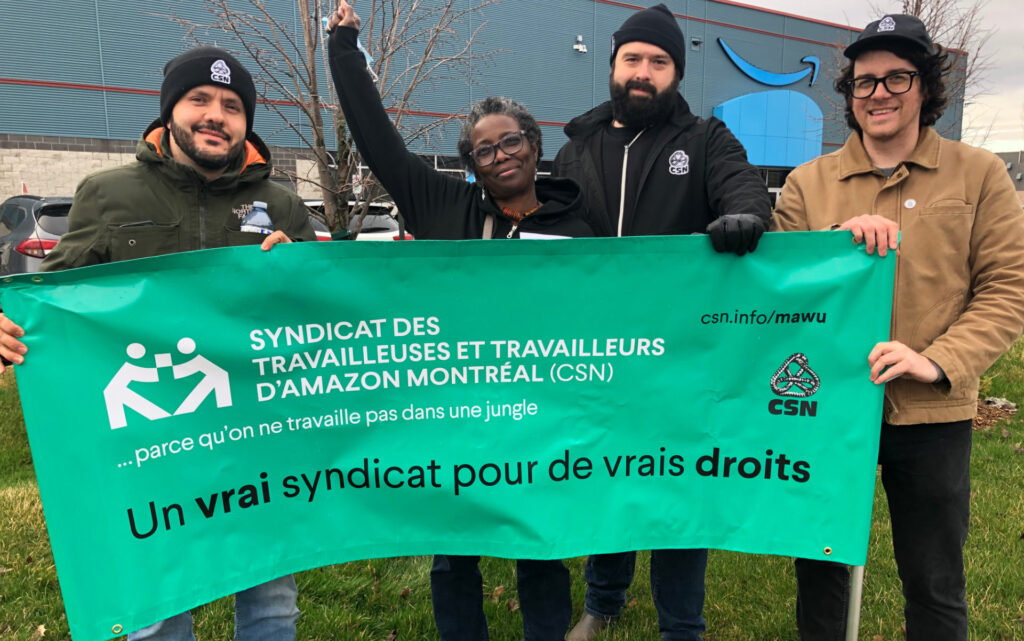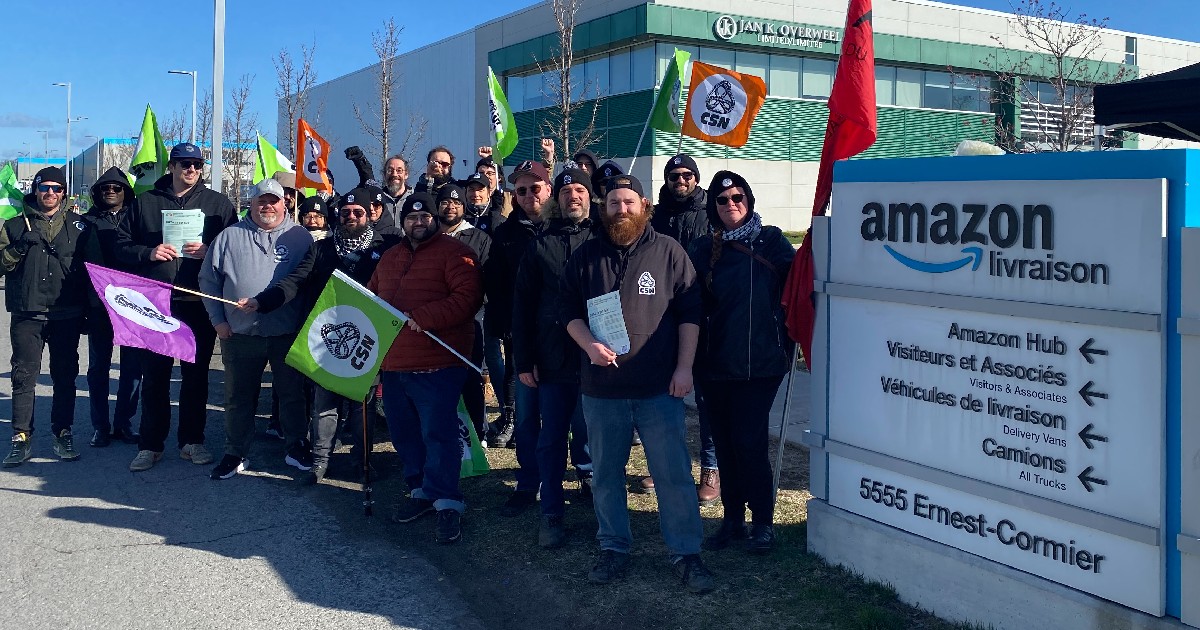Subscribe to our newsletter:
Last week, workers at Amazon's DXT4 warehouse in Laval, Quebec made history by creating the first Amazon union in Canada. Yet the two-year campaign has not been all smooth sailing: many organizers report vicious, barely concealed and often illegal efforts by the monopoly to prevent them from unionizing. North Star has investigated these tactics.
The union-busting industry
Union-busting is a big business. Hundreds of millions of dollars are spent every year by companies like Amazon to retain anti-union consultancy firms. These consultants advise Amazon on techniques for obstructing workers who seek to organize.
In 2022, the year that saw the first successful unionization of one of its warehouses in Staten Island, Amazon spent US$14 million on American anti-union consultants.
In American labour law, these consultants are also referred to as "persuaders". One of their principal activities is to conduct one-on-one meetings with workers in an effort to "talk them out" of joining a union.
Because of an American law which requires companies to disclose the money they spend on anti-union consultants, the names of these firms are publicly available. Curiously, Amazon's filings do not contain the names of large, well-known business consultancy firms like McKinsey or Deloitte.
Most of the firms they hire for union-busting have little if any online presence, and independent reports have turned up glaring inconsistencies in the data these firms file with the U.S. government.
Take, for example, the highest-paid firm disclosed by Amazon, The Rayla Group. Amazon reported paying them $7.6 million in 2022 and a further $1.3 million in 2023.
However, The Rayla Group's filings for 2022 and 2023 list $0 in receipts. In their own filings, several of Rayla's subcontractors list apparently false addresses, located on streets or in towns that simply don't exist. In their 2023 filings, all of Rayla's subcontractors were described as working for Amazon.
Information on the specific consultants Amazon hires in Canada is harder to come by, but there can be no uncertainty of Amazon's important role in the union-busting industry on this side of the border. In 2020, Amazon Canada's head of "employee relations" sat on the program committee of the Canadian LabourWatch Association's closed-door union-busting conference.
In Quebec, where one warehouse has already successfully formed a union, Amazon has signalled its intention to challenge the constitutionality of the Quebec Labour Code itself.

Mandatory anti-union meetings at Amazon job sites
Far from restricting their activities to strategy meetings in shadowy boardrooms, anti-union consultants are routinely deployed on Amazon job sites in order to directly confront pro-union workers.
At Amazon's BHX4 warehouse in Coventry, England, where a campaign to unionize has been underway since 2022, workers were forced to attend hour-long anti-union seminars given by Amazon's consultants. Captive-audience meetings are a widespread anti-union practice and a favourite tactic of Amazon.
At its JFK8 warehouse in Staten Island, New York, Amazon held no less than 25 captive-audience meetings per day in the six weeks leading up to the union vote, which workers were forced to attend as often as twice a week.
Workers at JFK8 said that many of their anti-union coworkers quoted talking points verbatim from the meetings in explaining why they didn't want to join the union. The Amazon Labor Union was nonetheless successful in unionizing that warehouse.
Amazon workers in Bessemer, Alabama, described lengthy captive-audience meetings, some lasting up to two hours, which were rife with disinformation. Among other things, Amazon's consultants told workers that forming a union would cause workers to lose their benefits and that the union would not help workers who failed to pay dues.
The messaging in Amazon's captive-audience meetings is similar to that used by other large companies seeking to suppress union activity over the years. The Teamsters union, which has supported union drives at Amazon warehouses in Alberta and Ontario, has posted to Soundcloud several recordings made by workers forced to attend such meetings at companies like Coca-Cola and FedEx.
Direct confrontation of pro-union workers
In addition to pushing anti-union messaging in group meetings, Amazon's consultants regularly force workers suspected of being pro-union into one-on-one interrogations.
During a union campaign at Amazon's ALB1 warehouse in Albany, New York, workers described how consultants from a firm called RoadWarrior Productions donned high-visibility vests in order to blend in with workers as they roamed the floor.
The consultants followed workers around the warehouse, interrogating them about the union's activities and reading anti-union talking points from a piece of paper.
Workers described how this harassment impeded them from doing their jobs, causing their productivity metrics to drop and putting them at risk of discipline or firing. RoadWarrior's filings to the U.S. government reveal that consultants were payed $3,200 per day "plus expenses" for their services to Amazon.
These confrontations are carried out by Amazon management as well as by consultants. At another Amazon warehouse in Lachine the Montreal area, a pro-union worker described how one-on-one meetings were used to prevent him from talking about the union with other workers:
"Every co-worker who talks to me, after a few seconds, the manager interrogates them. When they do that, people don’t want to talk to you anymore. I’m being isolated."

Unions fight back in the courts
Amazon's union-busting tactics have been the subject of many legal complaints and lawsuits against the company.
In Alabama, captive-audience meetings were one of 14 practices cited by the Retail Wholesale & Department Store Union (RWDSU) when they filed an unfair labour practices complaint with the National Labor Relations Board (NLRB) in 2022 with respect to Amazon's activities at the Bessemer warehouse.
While the NLRB did not rule that the captive-audience meetings were illegal, the RWDSU's complaint was ultimately successful on other grounds. The NLRB's decision allowed a new vote on the union in Bessemer.
Last year, the Amazon Labor Union filed a complaint against Amazon with the NLRB regarding captive-audience meetings at the ALB1 warehouse in Albany. The NLRB found that in those meetings, Amazon's representatives illegally threatened to withhold pay raises and benefits from workers if they voted to unionize. Months later, the state of New York passed a law banning captive-audience meetings.
In Quebec, the labour code is stricter than in the United States when it comes to union-busting. A complaint about Amazon's harassment of workers trying to unionize in Lachine is currently before the Tribunal administratif du Travail. A similar complaint is before the courts in the U.K.
As Amazon launches its attack on the Quebec Labour Code itself, workers and unions are preparing for a long legal battle against the e-commerce monopolist.
The legal front of Amazon's battle against organized labour will be further explored in a future North Star article.
Unionization movement at Amazon
- Amazon Peak Season Kills
- Amazon delivery drivers walk off due to extreme cold
- Amazon Workers Keep Getting Poorer
- UK Workers take on Amazon
- Amazon hires 1300 workers to bust British union
- UK Amazon workers voting on union recognition
- Two steps forward, one step back for Unifor at Amazon fulfilment centres
- Amazon workers in Quebec ready to form historic union
- Amazon at war with the Labour Code following Quebec union certification
- Amazon pours millions into union-busting meetings


